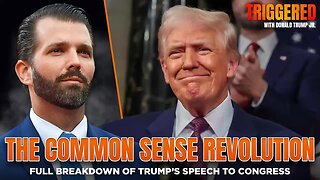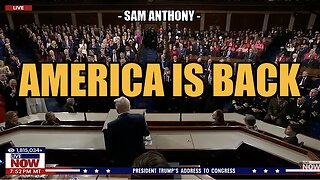Premium Only Content

🇺🇸📉 Trump's Tariffs: Undermining Decades of U.S.-Mexico Integration 🇲🇽🔄
Trump's tariffs on imports from Mexico were intended to protect American jobs and industries, but they carried significant implications for the long-standing economic integration between the two nations 🇺🇸🤝🇲🇽. For decades, the U.S. and Mexico have built a robust trade relationship, facilitated by agreements like NAFTA, which promoted free trade, boosted manufacturing, and encouraged cross-border supply chains 📈.
The implementation of tariffs could lead to several consequences:
1. **Increased Costs** 💰: Tariffs would raise prices on Mexican goods, leading to higher costs for American consumers and businesses reliant on these imports.
2. **Disruption of Supply Chains** 🔗: Many U.S. companies rely on Mexican manufacturers for parts and labor. Tariffs could disrupt these established supply chains, forcing businesses to seek alternatives, potentially in countries with less favorable relations.
3. **Economic Strain** 📉: Increased tariffs could result in retaliatory measures from Mexico, leading to a decline in exports for U.S. goods, harming American industries.
4. **Job Losses** ⚠️: While intended to protect jobs, tariffs could have the opposite effect, with many U.S. manufacturers depending on lower-cost imports to remain competitive.
5. **Impact on Partnerships** 🌍: The U.S.-Mexico relationship is not just economic; it encompasses diplomacy and cooperation on various issues. Tariffs could strain this partnership.
6. **Long-Term Integration Reversal** ⏳: Decades of integration risk being undone, leading to a more insular economy that could hinder growth and innovation.
In summary, Trump's tariffs posed significant risks to the economic ties between the U.S. and Mexico, potentially reversing years of integration and cooperation. The impact could echo through industries, consumers, and the overall health of both economies 📊.
-
 43:23
43:23
Donald Trump Jr.
11 hours agoNo Clap: Dems are a Disgrace but My Father is Bringing Back Common Sense | Triggered Ep.222
156K123 -
 18:29
18:29
The Rad Factory
1 day ago $3.90 earnedBuilding Shred Eighty a Custom Honda Snow Kart
47.2K7 -
 UPCOMING
UPCOMING
Precision Rifle Network
1 day agoS4E7 Guns & Grub - What makes group size increase?
31.9K2 -
 46:29
46:29
SGT Report
1 day agoAMERICA IS BACK! BYE BYE IRS!! -- Sam Anthony
74.2K97 -
 8:56:13
8:56:13
Dr Disrespect
18 hours ago🔴LIVE - DR DISRESPECT - WARZONE - 150 PLAYER LOBBIES
191K20 -
 1:27:35
1:27:35
Redacted News
12 hours ago"This is NOT normal" Trump just destroyed the woke mob as Dems in disarray | Redacted News Live
174K302 -
 1:39:52
1:39:52
Vigilant News Network
14 hours agoUNHINGED: Dems Say That Elon Needs to ‘Go Back to AFRICA?’ | The Daily Dose
110K27 -
 1:13:13
1:13:13
Sean Unpaved
13 hours ago $7.35 earnedQB Carousel with Guest Coach Herm Edwards
91.1K3 -
 1:04:28
1:04:28
Crypto Power Hour
1 day ago $6.31 earnedThe Crypto Power Hour - ‘In Crypto We Trust’
87.5K8 -
 28:55
28:55
CatfishedOnline
13 hours agoWoman Love Bombed by Salt-and-Pepper Scammer
53K7